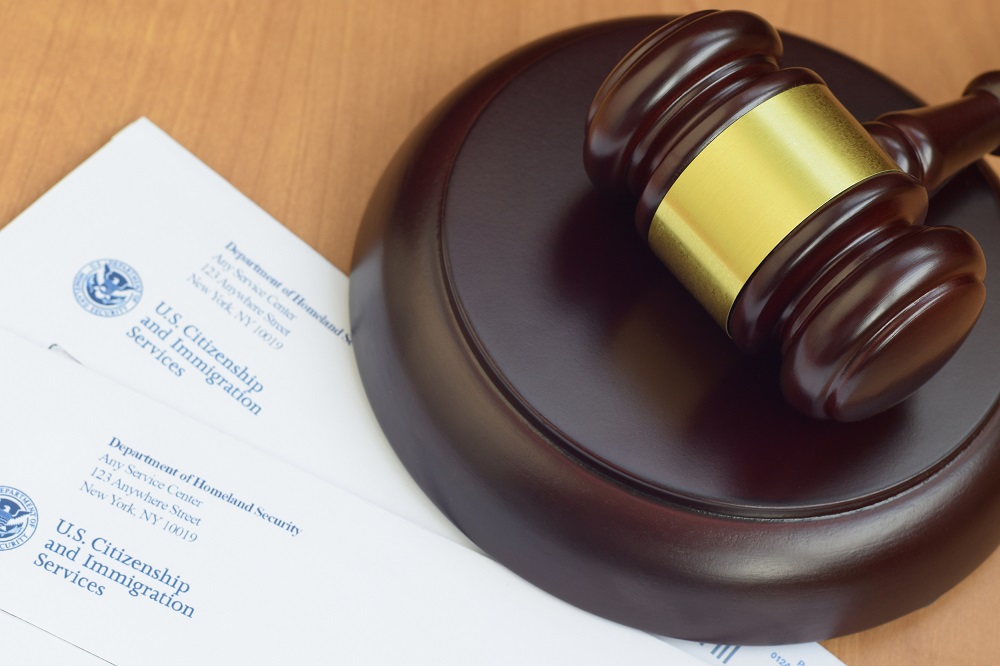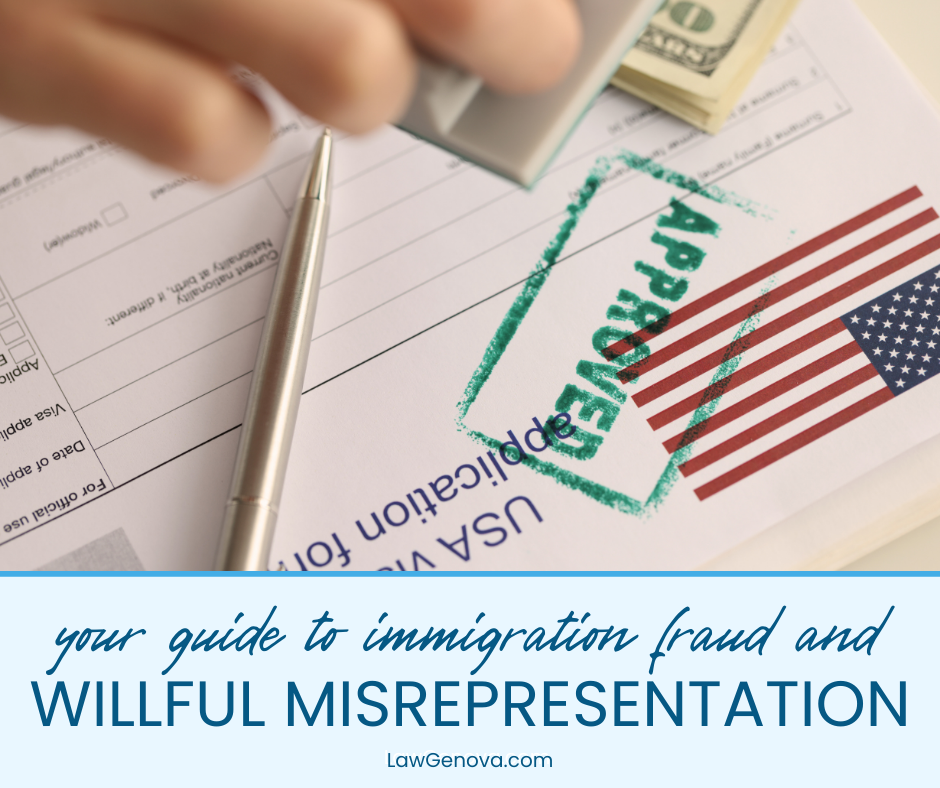Immigration fraud is a crime – and it’s one with serious consequences in the United States. The term immigration fraud is very broad, but just about any action you take to lie to or defraud the U.S. government falls under it. This guide explains immigration fraud, the possible penalties of a conviction, and how you can avoid mistakes that could get you thrown in prison, fined or barred from immigrating to the United States.
Make no mistake: Immigration fraud and willful misrepresentation are crimes. If the government charges you with one of them, an immigration attorney may not be able to help you.
What is Immigration Fraud?
Immigration fraud is the act of lying or willfully misrepresenting facts so you can gain an immigration benefit. That may include things like:
- Putting incorrect dates on immigration paperwork
- Lying to a U.S. Citizenship and Immigration Services (USCIS) investigator
- Leaving out information on an immigration petition
- Marrying someone for the sole purpose of getting a green card
Any time you’re not completely honest and up-front, you may be committing immigration fraud – but the law makes a distinction for material facts.
Related: Can you get a green card if you have a criminal record?
What Are Material Facts?
Material facts are facts that are important enough to affect the outcome of your case. For example, it’s not a big deal if you write that you lived at 123 Any Street when you really lived at 123 Any Road from March 2020 to the present – but it is a big deal if you aren’t truthful about the dates you lived there (or lie about the fact that you lived there at all).
Material facts are important to the outcome of your case, and it’s incredibly important to represent these facts accurately. Otherwise, the government may charge you with immigration fraud.

What is Willful Misrepresentation?
Willful misrepresentation is the act of purposely failing to be truthful. For example, if you know you lived at 123 Any Street for exactly one year but you say that you lived there for five years, whether you believe it will help your case or not, you’re willfully misrepresenting the facts.
It’s unlawful to willfully misrepresent facts on your immigration petition or while speaking with an immigration official, or during any other part of the immigration petition process. You must be completely honest and truthful, even if you think it may be damaging to your case or may result in an unfavorable decision.
What if I Make a Mistake on an Immigration Form?
Making mistakes – as long as they’re not willful misrepresentations of material facts – is typically okay. Sometimes USCIS will return a petition to the person who submitted it for corrections. That can make a case take much longer. But the good news is that the government doesn’t consider honest mistakes to be fraud or willful misrepresentation.
Many people choose to work with an attorney to avoid mistakes in the first place, though. When you work with a New York immigration attorney, she’ll fill out and file your paperwork for you. And because your attorney has significant experience with all the forms you need, you don’t have to worry about mistakes that could delay a decision on your case.

Who Investigates Immigration Fraud?
Usually, Immigration and Customs Enforcement (ICE) and U.S. Citizenship and Immigration Services (USCIS) investigate immigration fraud. In some cases, local law enforcement agencies also do some investigating – but typically, they turn over their findings to ICE or USCIS.
What’s the Most Common Type of Immigration Fraud?
There are several types of immigration fraud, but among the most common are marriage fraud and misrepresentation of material facts on immigration forms (or during interviews).
How Can the U.S. Government Prove Immigration Fraud Cases?
The government can prove that you committed willful misrepresentation or immigration fraud in court if it can show that all of the following apply to you:
- Made a false statement or wrote an incorrect “fact” on a petition about something that’s important to your case (not just a simple mistake or error that any reasonable person could’ve made).
- You made a statement and knew it was false.
- You intended to deceive the person on the receiving end of your statement (in this case, an immigration official).
- The person who heard or read your false statement needed to rely on it to make a decision in your case.
In a situation involving marriage fraud, which the following section outlines, the U.S. government may be able to prove that your marriage is fraudulent based on incorrect or inconsistent answers during an immigration interview, on a petition, or through investigative means.

Is Marrying Someone for a Green Card Considered Immigration Fraud?
Marrying someone only to get an immigration benefit, such as a green card, is definitely considered immigration fraud. However, if you marry someone because you want to be married to them, you’re eligible to apply for a green card. That’s what makes marriage fraud so common. Many people believe marrying a U.S. citizen or LPR is the “simplest” way to get a U.S. green card.
Routine investigation usually uncovers cases of marriage fraud cases. The USCIS official reviewing your petition will need to see all kinds of documentation that proves you’re in a valid marriage. They want to see things like joint account statements, receipts for gifts you’ve given each other, children’s birth certificates and other things that most married couples have on-hand. Additionally, a USCIS official will interview you and your spouse. If your answers are inconsistent or incorrect during the interview, the official may suspect that you’re committing marriage fraud to obtain an immigration benefit.
Both parties will get into legal trouble for committing marriage fraud. The U.S. citizen partner faces prison time (up to five years) and fines of up to $250,000, and the foreign national partner will be removed from the United States. Typically, the removal comes with a bar to reentry; that means the person can’t return to the U.S., even if they have a job, a family or other ties here.
Related: The complete guide to green card marriage

Penalties for Committing Immigration Fraud
The penalties for committing immigration fraud are harsh. In addition to any criminal penalties that you may face, you’ll be subject to deportation and will likely be permanently barred from returning to the United States.
Fines for Immigration Fraud
The fines for immigration fraud can be significant. If the government catches you misrepresenting facts on your immigration application, you may have to pay a fine of up to $250,000. If a judge convicts you of marriage fraud, you may have to pay a fine of up to $250,000 and spend up to five years in prison.
Deportation for Immigration Fraud
If officials catch you committing immigration fraud, you will be subject to deportation. That means the government will remove you from the United States and will likely bar you from returning, even if you have family or other ties here.
Related: What happens at an immigration interview?
Permanent Bar from Returning to the United States
If the U.S. government deports you for immigration fraud, it will likely permanently bar you from returning to the United States. That means you won’t be able to come back to the U.S., even if you have a job or family here.
Criminal Penalties for Immigration Fraud
In addition to the civil penalties described above, you may also face criminal penalties for immigration fraud. The specific penalties will depend on the nature of the fraud, but they can include prison time and fines.
Prison Time for Immigration Fraud
If you’re convicted of marriage fraud, you may have to spend up to five years in prison. If you’re convicted of misrepresenting facts on your immigration application, a judge may sentence you to up to 10 years in prison.
Related: Your guide to deportation (removal) from the United States
Does an Immigration Fraud Conviction Make You Inadmissible to the U.S. in the Future?
If a court convicts you of immigration fraud, the U.S. government deems you inadmissible. That means you’ll be barred from entering the U.S. If you’re already in the country, the government will deport you.
Can You Defend Yourself Against Immigration Fraud Charges?
It is possible to defend yourself against immigration fraud charges, but it can be difficult (and you should probably consult with a criminal defense attorney who’s familiar with immigration law). People commonly defend themselves against immigration fraud charges by providing proper documentation, proving that their marriages are legal and valid, or showing that they were under duress at the time they committed the fraud. There’s never any way to predict how a judge will rule, and no criminal attorney can promise you an outcome – but the best way to avoid immigration fraud charges is not to commit immigration fraud in the first place.
How Can You Avoid Immigration Fraud Charges?
First things first: The U.S. government can’t charge you with immigration fraud if there’s nothing suspicious about your application for an immigration benefit.
With that said, many people find it helpful to work with an immigration attorney to avoid mistakes on their paperwork or petitions, and to ensure that they’re compliant with U.S. immigration law.
If your immigration attorney sees something that seems “off” or that’s likely to catch USCIS’s attention, she’ll let you know. Your lawyer’s job is to ensure your forms are filled out correctly and honestly, and that you remain in compliance with the Immigration and Naturalization Act (INA).
The Bottom Line
The bottom line is this: Don’t commit immigration fraud. The consequences are too severe – and the end result is that you won’t be permitted to enter the United States, or worse, you’ll be deported.
If you’re considering immigrating to the U.S., you should talk to a New York immigration attorney about your options. Be completely honest with your attorney so she can find the best path forward for you.
Do You Need to Talk to an Immigration Attorney About Immigration?
If you need to talk to an immigration attorney, we may be able to help you. Call our office at 914-481-8822 to schedule a consultation with an experienced, knowledgeable immigration attorney who can answer your questions and give you the legal advice you need.


